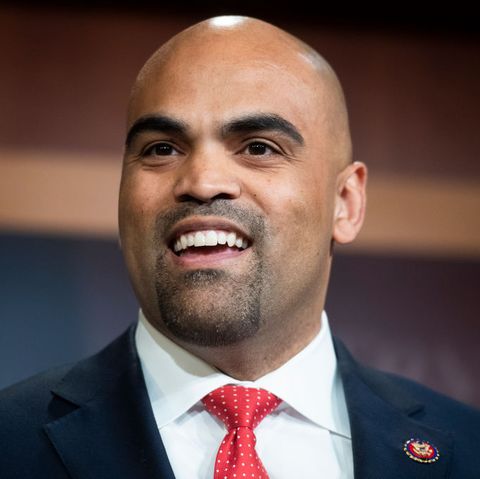COLIN ALLRED AND VAN TAYLOR have a lot in common. They’re both freshman lawmakers in the U. S. House of Representatives. They’re both from Texas. They’re both used to being part of a team: Allred spent four seasons in the NFL with the Tennessee Titans; Taylor was in the Marines for nine years. But there’s one major difference: Allred is a Democrat and Taylor a Republican, and at a time when our government (and seemingly every aspect of life) is intensely polarized, you’d have every reason to believe these two aren’t friends and don’t get along. But they are, and they do, and Men’s Health caught up with them during an early-morning workout to learn how they manage it.

.
Looking over the policy sections on your websites, we don’t see a whole lot that you guys agree on. So how exactly does being friends work?
Taylor: Colin was the first person I called to congratulate on election night in 2018. Our districts are intertwined—we have water issues together and transportation issues together—and I knew I was gonna have to work with him. I came to Congress to get things done for my district, and building relationships is the first step. A relationship begins with a phone call.

Allred: And it does help that we’re friends. You could spend all your time focused on where you disagree with someone. You could have a good argument every day if you wanted to, but you wouldn’t get much done. And anytime you don’t have a relationship with somebody, it’s gonna be easier to demonize them.
Taylor: You want to focus on what you can work on together. You have to accept the arguments on the other side as valid when they are. You don’t want to dismiss them—at least understand what they are so that you are able to converse. Because if you don’t know anything about what the other side is talking about, you’re not going to be able to understand their perspective.
Since your districts are next to each other, you guys automatically have something in common. What’s the best way to talk with a colleague you either don’t know or don’t particularly like?
Taylor: Start with family.
Allred: Always ask about their families. Then: “How’s life treating you?” Especially with the new members: “How are you settling into D. C.?” The older members: “How did you settle in?” Once you start talking to each other along those lines, you pretty quickly realize how many similarities you have.
Taylor: The other key to talking with people is to know where they are. Whenever I’m talking to anyone of Congress, I say, “Hey, this is what I think. This is why I think you should do this. But you need to do what’s good for you in your district.” It’s important to have those conversations and be honest with each other.
Allred: I always have a harder time when I feel like somebody’s repeating talking points. It’s like: I’m trying to have a conversation with you; you don’t need to lobby me. You’re also probably not going to change my mind just with talking points that we’ve all heard on the news.

How much of the bickering and vitriol that we see on TV is real and how much of it is just for show?
Allred: I don’t think that it’s as pervasive as it might seem on TV, but there are certainly people in D. C. who don’t like each other.
Taylor: And TV gravitates toward those people. “Hey, wanna go on TV and bash the other side?”
Allred: Also, it’s not like “Allred and Taylor Come Together to Work on Moderate Bill” is raging news.
More and more, it seems like that divisiveness is seeping into our everyday lives. What’s a solution to that? Other than working out together.
Taylor: You can’t just watch cable news to get your information. You have to get out of your ideological bubble.

.
Subscribe to Men’s Health
SHOP NOW
Allred: Same with social media. We’ve got algorithms that enforce your existing worldview. All of us now have to be more proactive about getting outside of our little bubble and have an understanding of all sides of the issues.
Taylor: We need to think about these conversations as an opportunity to educate ourselves and learn from other people. It’s a smart thing to have a diversity of perspectives. No two people agree with each other all the time. If you don’t believe me, ask your significant other.
Allred: And there are important differences! Don’t get me wrong. And that’s what our elections are about. That’s democracy. That’s healthy. What isn’t healthy is when you assume that the person who disagrees with you is also a bad person. Because if you can’t disagree without thinking someone else is bad or evil, then you start pulling apart the seams of our country, and we have to be very careful about that.
Source: Read Full Article
